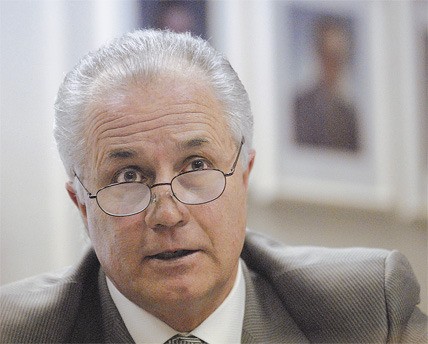Five-million six-hundred thousand dollars – that’s the total impact of state cuts on the Auburn School District budget for the current school year, according to district officials.
As state legislators in Olympia work out additional cuts in funding for public education beyond what Gov. Chris Gregoire proposed in December to make up for a $1 billion revenue shortfall in the proposed 2011-13 state budget, district officials are working under the constraints of cost-cutting measures.
Kip Herren, superintendent of the Auburn School District, said the district’s measures include a spending freeze to cut $1.25 million in expenditures for the current school year. Open positions will be left vacant. And to get through the current year, Herren said, the district is withdrawing $4.4 million from its almost $11 million reserve.
“We have to use our reserves because we have to honor our contracts,” Herren said. “They are signed, and there’s no getting out of that. The goal of the spending freeze is to reduce $1.25 million of what we would have spent the remainder of the year, so we’ll have it to handle next year’s budget. That’s where the problem will be.”
Further reductions in revenue are expected, including the loss of $2.5 million in federal funds coming to the district from the American Reinvestment and Recovery Act (ARRA) when those monies go away.
“Mostly, the feds sent the Auburn School District and every other school district a proportionate of how many staff we have, called Edu-Jobs,” Herren said. “They sent it to us because the ARRA dollars will go away, and two years ago the state used ARRA dollars to plug the holes. Edu-Jobs is supposed to be earmarked for education, but this is how the state got around it. They basically let us take the money, and then February through July they are withdrawing $2.9 million from that allocation that would normally come to us. Smoke and mirrors.
“… They did all this retroactively. We drew up our budget last spring, hired people, committed to contracts, then in December they let us know there would be all these cuts, including the Edu-Jobs,” Herren said. “We put together a plan last spring to deal with where we thought our shortfalls would occur. We put all the puzzle pieces together. The piece that we didn’t have in the plan was the unexpected. What we didn’t anticipate was a retroactive decrease in money we were told we were going to get. It’s like somebody knocked over the table, all the puzzle pieces are on the ground, and pieces are missing.”
Critical steps
Herren said the district could just go on with business as usual, but that would be disastrous.
“Fortunately for us, we had almost an $11 million reserve. But in fact, if we don’t change our programs and reduce our costs – and I don’t see this changing for three to five years – if you project out three years out, the Auburn School District would be bankrupt,” Herren said.
Gregoire announced her preliminary budget in December. It would reduce or cut funding altogether in seven areas critical to the state’s public K-12 education. It would:
• Eliminate $216 million for kindergarten through fourth-grade class-size reduction.
• Eliminate $18.6 million for the gifted-student program.
• Suspend $99.5 million in annual bonuses for National Board-certified teachers.
• Suspend $56.3 million for annual step increases for teachers.
• Suspend $860.2 million from Initiative 728, which reduces class size and provides teachers with professional development.
• Suspend $253.3 million from Initiative 732, which grants cost-of-living increases to teachers.
• Suspend $57 million in planned increases for all-day kindergarten.
The state Legislature began its work on Gregoire’s budget in January.
The state is also proposing to roll everything back to the definition of “basic education” as it was in 1982. So, for example, because all class-size reduction dollars came after 1982, those dollars would no longer come to the districts.
“The solution is to focus on priorities,” said Herren. “There are many things that the district does that may not be the essential core mission of a school district.”
Randy Dorn, superintendent of the state Office of Superintendent of Public Instruction, called Gregoire’s preliminary budget the worst he had seen in his 30 years working in education.
“But this budget isn’t all about numbers, it’s about kids,” he said in a statement. “And once again, our kids got cut.”
Numerous calls to principals in the Auburn School District for this article were not returned.



